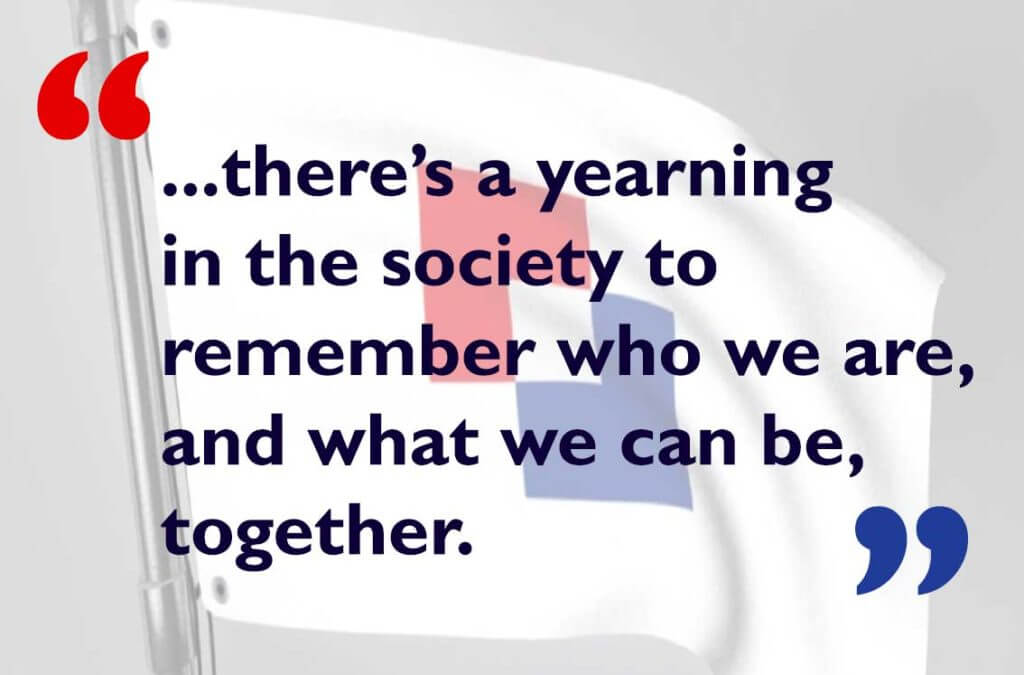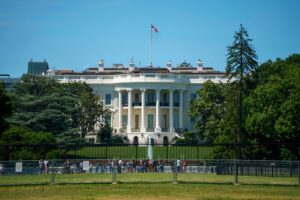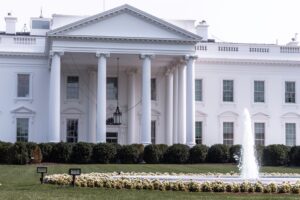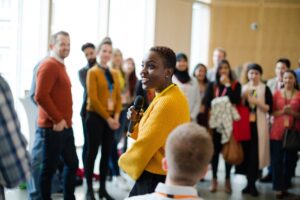Delivered by David Blankenhorn
Transcribed by Luke Phillips; edited only slightly, for clarity
Thank you, Donna. Wow, it’s such an honor to be with you tonight.
Tonight’s an important night, not because of a speech, but because of you. Because of what you’re doing here. Because of what we’re doing here in living rooms and civic spaces across the country. We’re coming together across the political divide to establish a more perfect union- our union, what brings us together.
It shouldn’t be particularly unusual for Americans to do this. It shouldn’t be unusual, particularly at this time of year, when our Constitution calls upon our elected officials to report to us about the state of our union. But it is an unusual thing to do. What we’re doing tonight is a rare and unusual thing. And I think that’s why it’s an important night.
History is not going to remember this speech; but history may remember what we do here. History may remember what we decide to do here about the responsibilities that we owe to ourselves and to each other, and our we’re going to go from here and the months ahead to serve our country. So it’s an important night.
Look, we didn’t come here to deceive ourselves. What’s the state of the union? It’s weak. What’s the state of the divide? Our divisions are strong, and getting stronger. We’ve kind of reached that point in our society where we view people on the other side of the political divide from us not only as misguided, but really as bad people- as threats. And we view them as people whose ideas are so alien and strange and dangerous as to be almost incomprehensible to us. How could decent people think this crazy stuff?
That’s where we are. So many of us, today.
So how did we get into this mess? How did we let things go so far, into this kind of valley of rancor? Well, there are a lot of answers to this question, but for me one of the most important answers is that we’re forgetting who we are. We’re forgetting who we are- we’re forgetting what brings us together as Americans despite our differences.
So what is it that we’re forgetting, what is it that unites us, what is this common American identity?
I don’t have to make up any new sentences to tell you this! I just want to say some words to you that should be very familiar. They are from some of our most important and eloquent statements and poems and anthems about who we are as Americans. You’ll recognize these.
“My country tis of thee, sweet land of liberty, of thee I sing.”
“Conceived in liberty, and dedicated to the proposition that all people are created equal.”
“With liberty and justice for all.”
“I, too, am America.”
“This land was made for you and me.”
“Let freedom ring!”
“Free at last, free at last, thank God Almighty, we are free at last!”
Now when I hear these words, besides sending a tingle up my spine, it tells me that we are a free people who care for one another. A free people who care for one another. Freedom, because that’s the American birthright, that’s the founding idea, that’s what the Founders bequeathed us, that’s why the Constitution says that one of the most important purposes of the government is to secure the blessings of liberty. To live a life that is free, that is why people, still, from all over the world, want to come here, the idea of freedom.
Care for one another. Have mutual respect, have empathy, look out for the other person, caring for one another in a form of civic friendship that is bigger than political differences. And why? Partly because we humans are hardwired to want to connect with others, and partly because we know as Americans that if we don’t, the whole project itself comes apart, and freedom itself, it doesn’t work. Things grind to a halt.
James Madison said it beautifully- he said, in The Federalist Papers, “self-government requires a higher level of virtue in the citizens than any other form of government.” So when we govern ourselves, it requires this virtue. Now the virtue is just a kind of caring for each other, looking out for one another, recognizing one each other’s essential dignity. We use the word civility a lot in this work, and I think one of the things we learn from Madison is that civility is not simply good manners appropriate to the circumstance. Civility is also the inward desire to do good to your opponent. That’s the virtue he was talking about, without which our project in ordered liberty is at risk.
Now, there are several really amazing things about this idea about who we are as Americans, a free people who care for one another. One of the most amazing things is that it is an idea! It’s something that we think about each other. It’s not based on fixed attributes like what color your skin is, or how you pray, or whether you pray. It’s not based on sexual orientation, it’s not based on ethnicity, it’s not based on the language that your parents or grandparents spoke. It’s about an idea that is in our minds and hearts about what we owe to ourselves and one another who want to live in this certain way. We’re one of the few countries in the world of which this can be said.
Another amazing thing about it is that it’s constantly expanding. Each generation renews this idea in its own way. It’s like a flickering flame was lit by the Founders, and this flame is passed from each generation to the next, and the task of each generation is to make that flame burn brighter, to make its warmth extend more broadly, so that more of us can be included in that warmth of civic friendship. And so, the circle in 1787 was much narrower, much more restricted, than it was in 1860, when we fought a great civil war over whether enslaved people would be allowed into the circle of friendship and warmth. And today, the circle is broader still, and I think in the future we will find, if we remain true to ourselves, that this idea of free people who care for one another will be continually deepened and expanded.
One of my favorite poets is Langston Hughes. He put it this way-
“Oh, I say it plain; America never was America to me.
And yet, I swear this oath- America will be.”
Now, when Langston Hughes wrote those words in 1935 in a little hotel room in New York City, he might as well have been reciting the words of the Pledge of Allegiance- he might as well have been singing the National Anthem- so deep is this idea, that we can be ourselves and more. We become more who we are. America will be.
A final thing about this kind of shared identity is that it’s not conservative, it’s not liberal, it’s not Republican, it’s not Democrat, it’s not red, it’s not blue- it’s both. It’s both.
So if you’re a conservative and your north star is the inheritance that we cherish from the Founders- the Constitution, the basic documents that guarantee us freedom, a free way of life- if that’s what’s important and meaningful about American identity to you, you’ve come to the right place! Here it is! My country tis of thee, sweet land of liberty, of thee I sing!
And if you’re a liberal and your north star is the desire for social justice, and for greater inclusion, you’ve come to the right place! Here it is, it’s right here! America never was America to me. And yet, I swear this oath- America will be.” There it is.
You know, I’m a little embarrassed telling you this, because you know it. I don’t think you’d be here if you didn’t know it- I don’t think you’d be watching from around the country, if you weren’t already engaged in the process of remembering this, remembering who we are. That’s why we’re here. You’ve caught the spirit!
And I see it every day, and it’s the most rewarding part of my work, I see this around me every day. The way I think about it is like I’m standing on a corner and there’s just this wind, and I’m going with it because it feels good, it’s helping me go with others to the uplands. And it’s not because I’m sitting there huffing and puffing and trying to make the wind blow, or that you are, or coming up with clever ideas. It’s that there’s a yearning in the society to remember who we are, and what we can be, together. There’s a yearning for this and it feels like it’s just this wind- and you’ve caught this wind, you’ve caught the spirit. I see it every day and it’s so beautiful.
Donna Murphy, who just introduced me- when I first met Donna, we talked about guns. Donna hates guns. She thinks guns are terrible. She thinks the country would be much better off without guns! And she wants gun control. I’m a Southerner and I grew up with guns, and I was just joking with her- I said “Donna, maybe you should go to a gun shop or two and talk to people there about what they think about guns, it might give you a new perspective.” I was just messing around. But it’s what she did! She put on a baseball cap and went and talked to some people at gun shops! And most amazingly, today she’s the lead organizer for Better Angels, and every day she talks to people who feel passionately about the Second Amendment. And she still wants gun control, and they still want to protect their vision of the Second Amendment- but they do so as friends and as people who can see the good in the other person’s point of view, even if they don’t agree with it. People who have an inward desire to do good to their opponents.
And out there tonight, there’s another amazing guy, Christian Sarabia, who’s watching from Carol Hall at Graceland University in Lamoni, Iowa. He’s the head of the College Young Republicans. And with him tonight, same hall, same college, is the head of the Young Democrats, a great guy named Anthony Ginger. Together, they’ve brought together the Young Republicans and Young Democrats, they’ve formed a Better Angels club at Graceland, and they’re tearing off the roof! They’re doing great work out there, together. They don’t agree, but they’re trying to figure out how to do this a little bit better, perhaps, than their elders have done. And it’s such a wonderful, wonderful thing to see.
And it’s not just Better Angels. We’re just a little part of this thing- there are many, many groups around the country, many individuals who are doing this kind of work. So a shoutout, tonight, to Pearce Godwin, who started a group called the National Conversation Project which is becoming a kind of umbrella for all the organizations that are involved in this. And that umbrella is covering more and more individuals and organizations every day! And a special, wonderful shoutout to Liz Joyner down in Tallahassee, Florida, who started a group called The Village Square. She started doing this years ago, she’s the model for so many of us. She was doing this before it was cool, I promise you. So it’s wonderful- wonderful people, wonderful feeling of movement in the society, motivated sometimes by a kind of heartsickness by how far we’ve gone in the direction of rancor, and then wanting to do something better.
So, what’s our agenda? Where are we going from here? What are we supposed to do with this wind, this spirit that we’ve caught?
I just want to, very quickly, as I close tonight, mention three ideas that I think are perhaps worthy of consideration. I could simplify them by saying: change ourselves, change our complexion, change the rules. Those are the three.
Change ourselves. Well, that’s what we’re doing every time we come together across the divide and speak with one another rather than at or about one another. Every time we do that, that’s the mission. Because we know, from our Better Angels evaluation data, that every time we do this, people walk out of those rooms less polarized than they were when they came in. So this citizen-to-citizen depolarization is the foundation of everything that all of us are doing. And we know that it’s working for us.
Has it moved the metrics in the nation? Has it changed the national survey data that show polarization that comes from places like the Pew surveys and the American National Election Studies survey?
No. It hasn’t. There are three hundred million Americans out there, and we are only doing workshops now by the thousands.
But, we are figuring out how to scale this work, we are figuring out how to work together. More and more people every day are becoming involved. And so, changing ourselves- changing ourselves until we finally change enough citizens to change the national metrics on these numbers. That’s a really important thing to do.
Change our complexion. We don’t look enough like the country we’re trying to serve. We just don’t. It’s a weakness.
One of these things is we tend to be more upscale. Most of Better Angels’s members are college-educated people, with four-year college degrees, some of them higher. Most Americans do not. So if we want to look like the country we serve, we need to do much more to bring in working-class, blue-collar, low-income people, not just as members, not just as an afterthought to invite to something, but into positions of real power and responsibility in every level of the organization. If we don’t do that, we’re not looking like the country we serve.
Here at Better Angels we have what we call “The Better Angels Rule.” We’re supposed to be evenly divided between red and blue at the level of funding, board, staff, leadership, and participation in the program- and we do have that.
But we don’t have nearly enough people who are strong supporters of President Trump. You saw some of them tonight- you saw brother Richard Lynch, Greg Smith, some others- but we don’t have enough. We don’t look like the country we serve, in that respect. So I’m just saying to Greg- he’s out there, he would even be here tonight if he weren’t recovering from a health situation- I’m saying to you man, it’s on you. It’s on other people like Greg and like Richard in our organization, and in other organizations, to step up and show leadership on this. It’s up to all of us- but it’s especially on our conservative friends who support President Trump.
We must make this change, or else we’re kidding ourselves about the real possibility for depolarization. So I don’t think there’s anything more important for any of us to do over the next couple of months, than to be serious about changing our complexion in this way.
There are other things we need to do. Especially at Better Angels, and maybe elsewhere too. We tend to tilt a little male, and white, and old, in our leadership. It’s a good thing I don’t fit into any of those categories! But we do. And it’s something we need to work on.
Change the rules. I’m really grateful to Bryan Benson, who I think is here tonight, and Mark Beckwith. Bryan’s a big conservative, Mark’s a big liberal, and they came up with this idea when we were talking about this very talk tonight, that we need to change the rules of the conversation. Change the rules of the conversation. Not just for us internally, as Better Angels, but for the institutions of society.
And so if you think about, for example, Congress- fifty years ago, most members of Congress spent most of their time talking to each other to legislate, both within their party and across party lines. New studies show that members of Congress nowadays spend only about 10% of their time actually legislating. The other 90% of the time is spent raising money and doing PR, which is adversarial, “why I’m different than these terrible opponents.” We can change the rules. There’s nothing inevitable about this- the rules that govern Congress can be changed to encourage members of Congress to do something more like what we do, where we talk to each other and try to work together in some ways.
If you think about higher education- a lot of college campuses you go to are completely dominated by one political point of view. You go to a little Christian school somewhere in the South, where I grew up, and it’s a conservative-dominated political environment. You go to an elite liberal arts school somewhere and it’s almost entirely a liberal philosophy governing things on the campus. These rules can be changed, so that in the pursuit of knowledge, everybody gets a voice- everybody gets to speak freely, with their full voice. This is something that can be done.
In the media, good grief- is it really inevitable that all the rules of engagement in the media have to be biased towards rancor, and accusation, and vitriol, and name-calling, and lowest-common-denominator mud-slinging, and food-fighting- is it really necessary that this be the way that our media operates? There’s nothing inevitable about this.
So we have to change the rules of the conversation, not just for ourselves, as we’re already doing, but for the powers and principalities, for the institutions that really shape so much of our society.
Now this is very, very hard work. We’re just beginning. In some ways it’s easier, or at least more direct, when it’s just ourselves that we’re changing, our own attitudes about each other as citizens. It’s harder when we think about changing institutions and how they operate. But this is the challenge for us, this is where we have to suit up and figure out how to do this. We will not depolarize America if we only depolarize ourselves. It has to be our institutions as well.
My friends, now is our time, now is our time. Now is our time to remember who we are- now is our time to show America who we are, and what we can be together. Now is our time to take that flame and make it burn brighter, so that all of us- liberal, conservative, Trump, anti-Trump, red, blue, all of us- have room inside that circle of warmth and civic friendship, all of us.
And we’ll do something very important for our country if we can do that. It’s our mission. To use a word from my own tradition, that’s our calling. And I believe we are called to do this. And we’re going to do it seriously, we’re going to do it together, we’re going to do it with love, with love in our hearts, and in a spirit of patriotic empathy.
Thank you for listening.




